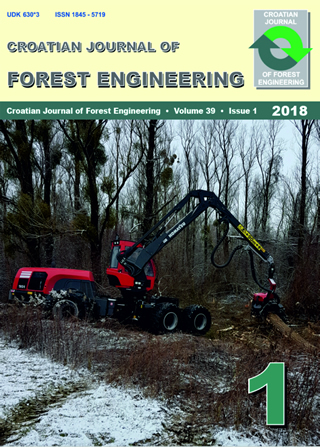Planning Forest Road Network in Natural Forest Areas: a Case Study in Northern Bosnia and Herzegovina
volume: 39, issue: 1
pp: 12
- Author(s):
-
- Petković Vladimir
- Potočnik Igor
- Article category:
- Original scientific paper
- Keywords:
- forest road network, planning, forest road density, AHP, Bosnia and Herzegovina
Abstract
HTML
Natural forests are one of the three types of forest management in terms of origin. These forests
are of seed origin and they regenerate naturally. Therefore, natural forests are the most important
forest category from the point of view of timber production, as well as its quality and
biodiversity. The natural forests accessibility and overall forest accessibility are insufficient
for sustainable forest management. This is the reason for dealing with planning of forest roads,
actually planning of forest accessibility and designing of forest roads in this forest category.
This task requires quantity and quality analysis of the current forest road network, determination
of optimal density of forest roads, determination of suitability of forest area for the construction
of forest roads and designing of forest roads in the end. Planning of forest roads is
carried out at strategic level. Analytic Hierarchy Process (AHP) allows the selection and
evaluation of influential factors related to planning of forest roads. The tools of Geographic
Information System (GIS) allow a complete spatial and statistical analysis and management
of data collected from the forest management plans or data surveyed in the field and obtained
by means of »Digital Terrain Model« (DTM) and AHP method. Planning of forest roads will
be done in the Management Unit (MU) »Prosara«, located in the northern part of Bosnia and
Herzegovina (BIH). The current density of forest roads is 7.3 m/ha in natural forests of this
management unit. The optimal density of forest roads should be 17 m/ha. The length of new
forest roads designed in the MU »Prosara« is 21 km, and forest accessibility has increased to
13.5 m/ha.

